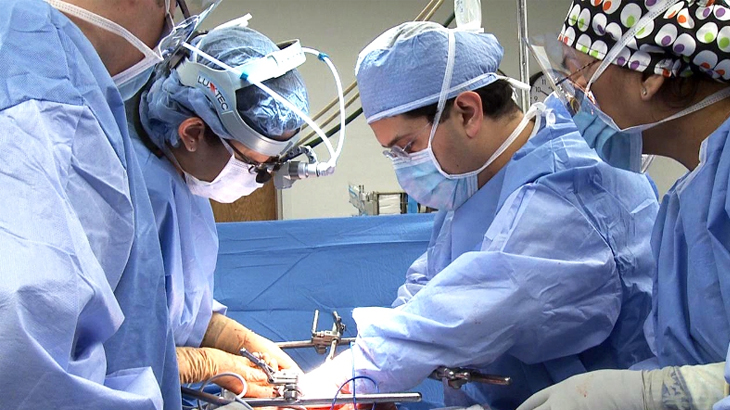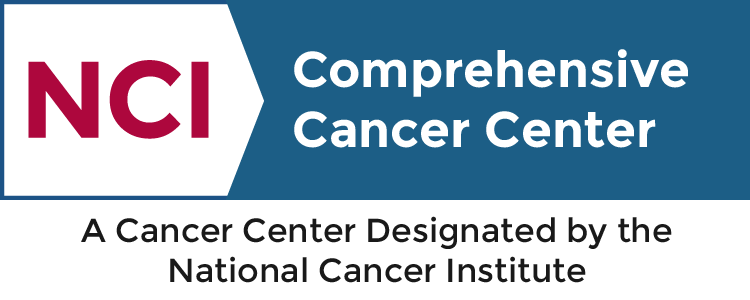
What is surgical oncology?
Surgical oncology uses surgery to diagnose, stage, and treat certain cancers. At MedStar Health, our fellowship-trained surgical oncologists are surgeons with additional years of education and training in treating people with cancer. Here, you'll find a team of experts, each with their own area of surgical expertise, working together to achieve your best outcome.
Our approach
We work as a team using the latest surgical techniques to find, diagnose, stage, and treat cancer.
Our experienced surgical oncologists work with a multidisciplinary team of expert specialists, including pathologists, radiologists, medical oncologists, radiation oncologists, and others. Together, we will develop a treatment plan that will be most effective for you. We base our recommendations on the latest research and use state-of-the-art surgical procedures, including minimally invasive or robotic surgeries, when appropriate. We also offer you access to the most current cancer clinical trials, including surgical techniques that may provide new and better ways for treating cancer.
We also specialize in providing second opinions, if you receive a diagnosis elsewhere. Sometimes, this confirms what you already know and helps you confidently make the next right decision. In other cases, a second opinion may reveal additional surgical options to treat your cancer.
We understand that cancer treatment is a major life challenge, which is why we believe in caring for the entire person. No matter how long or difficult your path to recovery may be, we offer you and your family compassion, caring, and respect every step of the way.
Learn More About Cancer Support Services
How is surgery used to treat cancer?
There are several reasons someone with cancer may need surgery either alone or in combination with other treatments, such as radiation therapy, immunotherapy, targeted therapy, chemotherapy, and others. Surgical oncology may be used to:
- Collect a tumor biopsy and diagnose cancer
- Remove a portion of a tumor (debulking surgery)
- Determine if cancer has spread
- Restore the body's natural appearance (reconstructive surgery)
- Relieve symptoms or side effects, such as pain (palliative surgery)
- Prevent cancer from spreading to another part of the body
Am I eligible for cancer surgery?
Eligibility for cancer surgery depends on several factors, including the size, location, and stage of your tumor. Your age, overall health, and treatment goals will also impact your surgical candidacy. Your cancer team will thoroughly review your treatment options with you, including whether or not you would benefit from surgery.
Conditions we treat
We commonly treat the following types of cancer with surgical oncology:
Types of surgical oncology
There are many different types of surgical procedures used to treat cancer. The surgery you have will depend on the location, stage, and size of your tumor, along with other factors. In some cases, our surgical oncologists can use minimally invasive surgical techniques, such as laparoscopy and robotic surgery, which involve smaller incisions and may facilitate a faster recovery.
In other cases, open surgery is recommended as your best treatment option. This requires your surgical oncologist to make a larger incision to remove part or all of a tumor and any necessary margin (healthy tissue).
Other specialized surgical procedures may include:
- Intraoperative heated chemotherapy/hyperthermic intraperitoneal chemotherapy (HIPEC): One of the most advanced treatments available today, HIPEC is a heated, highly concentrated chemotherapy treatment that is delivered directly to your abdomen during surgery. Unlike traditional chemotherapy, which travels throughout your body, HIPEC delivers chemotherapy to your abdomen only, allowing for higher doses.
- Cytoreductive surgery: During this surgical procedure, your specialist removes part of a malignant tumor that cannot be completely removed. The procedure helps to enhance the effectiveness of radiation or chemotherapy.
There are many other different procedures that may be used to treat patients with cancer that are performed in collaboration with other specialists. For example, a dermatologist may perform Mohs micrographic surgery on a patient with skin cancer. Other procedures that may offer benefits for certain patients include endoscopies, embolization procedures, and others. These may also be performed by other highly-trained professionals.
Side effects of surgery
Each surgical procedure comes with its own set of risks and potential complications. Certain medical conditions, age, and other factors may affect how your body responds to surgery. However, our surgical oncologists are experts at minimizing these risks. In addition, your care team will always review the details of your surgery with you so you can compare the benefits with any possible risks. It's always important that the advantages of the surgery outweigh any potential side effects.
The most common side effects during and after surgery include:
- Bleeding
- Blood clots
- Damage to nearby organs or nerves
- Infection
- Pain
Additional information
Awards & recognitions

Georgetown Lombardi Comprehensive Cancer Center is the only National Cancer Institute (NCI) -designated comprehensive cancer center in the Washington, D.C., region. Our cancer research engine giving patients access to breakthrough cancer treatments and clinical trials.
Looking for expert cancer care?
With multiple locations throughout the region, patients have access to many of the nation’s renowned cancer specialists offering high quality care, second opinions and a chance for better outcomes close to where they live and work. Georgetown Lombardi Comprehensive Cancer Center, one of the nation’s comprehensive cancer centers designated by the National Cancer Institute (NCI), serves as the research engine allowing patients access to clinical trials that often lead to breakthroughs in cancer care.
Our locations
Distance from Change locationEnter your location
MedStar Franklin Square Cancer Center at Loch Raven Campus
5601 Loch Raven Blvd. Russell Morgan Building First Floor Baltimore, MD 21239
MedStar Georgetown Cancer Institute at MedStar Health Bel Air Medical Campus
12 MedStar Blvd. Ste. 180 Bel Air, MD 21015
MedStar Georgetown Cancer Institute at MedStar Franklin Square Medical Center
9103 Franklin Square Dr. The Harry and Jeanette Weinberg Cancer Institute Suite 220 Baltimore, MD 21237
MedStar Georgetown Cancer Institute at MedStar Georgetown University Hospital
3800 Reservoir Rd. NW Washington, DC 20007
MedStar Health: MedStar Georgetown Cancer Institute at MedStar Montgomery Medical Center
18105 Prince Philip Dr. TG100 Olney, MD 20832
MedStar Georgetown Cancer Institute at MedStar Washington Hospital Center
110 Irving Street, NW Washington, D.C., 20010
MedStar Georgetown Cancer Institute at MedStar St. Mary’s Hospital
25500 Point Lookout Rd. First Fl. Leonardtown, MD 20650
MedStar Georgetown Cancer Institute at MedStar Southern Maryland Hospital
7501 Surratts Rd. Ste. 101 Clinton, MD 20735









